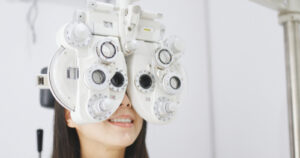
8 Tips for When You Buy Your Next Pair of Glasses
Posted by: Rocky Mountain Eye Center in Eye Care on May 11, 2023

If you are due for a new pair of glasses, the process can be overwhelming! Between choosing a frame, considering lens options, and deciding whether a special coating might be right for you, there are a lot of decisions to be made.
Keep reading to learn eight tips that can help make the process easier when you are buying your next pair of glasses!
1. Get Your Eyes Checked!

Before you invest in a new pair of glasses, the first thing you should do is make sure that your eye prescription is current and your eyes are healthy. The best way to do this is to schedule a comprehensive eye exam.
During the exam, your eye care professional will give you an accurate eye prescription and check your eyes for any signs of potentially troublesome eye conditions. Having an eye exam before getting new glasses ensures the quality of your vision and the health of your eyes!
2. What’s Your Style?
As much as the clothes you wear, the glasses you choose can express your personal style. Glasses may even be more of a statement than your wardrobe: you certainly change your clothes more often than you change your glasses!
When looking at frames, ask yourself what you want your glasses to say about you. A larger, chunkier frame may express your quirky side, while a rimless frame may exude an air of quiet confidence.
Clear frames convey your creative personality, where colorful, geometric options reveal your interest in the latest trends in eyewear.
3. What Lenses Are Made of Matters!

Consider your lifestyle when choosing the type of lens style that’s right for you. The most common lens material today is plastic, as it is light, durable, and largely impact resistant.
Another lens choice is polycarbonate plastic, which can make thinner and more impact-resistant lenses than regular plastic. Polycarbonate lenses can be a good choice for children’s glasses and glasses for people who regularly participate in recreational sports like basketball or soccer.
In some cases, the best lens option is glass, which has a higher index range. Glass may be your best choice if you have a particularly strong prescription, as mineral glass offers thinner lenses with fewer distortions.
4. What Can Your Lenses Do For You?
What do want your lenses to do for you? If you want to go from indoors to out in the sun without changing glasses, photochromatic lenses, also called transitional lenses, offer you the convenience of a single pair of glasses.
Polarized lenses have an embedded chemical film that blocks harmful UV light from the sun, making them a good choice for prescription sunglasses. If you work in front of a screen all day, an office lens that allows you to see clearly between 10’ and 24” can help you maintain a healthy, natural head position.
5. Pick Your Focus!
Do you need glasses only for clear vision at a single distance or for two or more distances? If you need vision correction at multiple distances, a bi- or tri-focal lens might be right for you!
With progressive or no-line lenses, you can have crisp vision at as many distances as you need. While these lenses may take a bit of time to adjust to, you’ll soon appreciate the ability to see clearly at more than just one distance.
6. Protect Your Glasses and Your Eyes With Special Coatings!
You can add protection for your eyes and resilience to your new glasses by opting for a lens coating. Depending on your needs, there are three basic coating options for your new glasses: scratch-resistant coatings, clear ultraviolet filters, and anti-reflective coatings.

Even if you treat your glasses with extreme care, some scratches are inevitable. Scratch-resistant coatings extend the life of your glasses by protecting them from scratches caused by everyday wear and tear.
For even more protection from wear, there is TD2 coating which is applied to both the front and the back of your lenses for total protection. If you don’t like wearing sunglasses when you are outdoors, clear ultraviolet (UV) filter coatings provide UV light protection with any tinting.
This coating can also protect the health of your eyes if you work in an indoor environment where you are exposed to artificial UV light sources. Anti-reflective coatings are often the best coating option, offering scratch-resistance and UV light filtering as well as anti-glare technology all in one coating.
They can further improve the quality and clarity of your vision, making it safer to drive at night and work at a computer screen for longer.
7. Give Your Glasses Some Time to Settle into Their New Home!
Change can take some adjustment! Your eyes may need some time to get used to a new pair of glasses. This is especially true if your eye prescription has changed for the first time in several years.
Most opticians recommend wearing your new glasses for a week or two. If you are still having issues with your new glasses, your eye care provider can meet with you to ensure your new glasses are just right for you!

8. Don’t Neglect Your Prescription Sunglasses!
If you are getting new glasses because your prescription has changed, don’t forget to change the lenses on your prescription sunglasses. You’ll be sure to want the same clear vision your new glasses provide whether you are indoors or out!
With all the frame options, lens choices, and special coatings available, it’s easy to find a pair of glasses that you will love! Today’s glasses not only make you look great, they protect the health of your eyes and ensure the quality of your vision. We can’t wait to see you in your newest pair!
Let us help you find the new glasses that are perfect for you! Call Rocky Mountain Eye Center today to schedule a complete eye exam and a visit to our optical shop!



